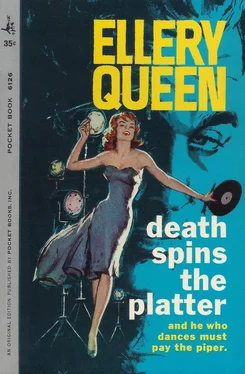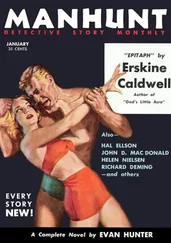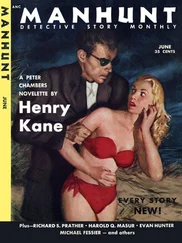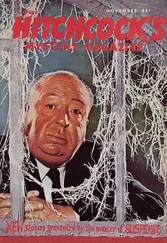“Thanks,” Layton said, putting away his notebook. He nodded to the redhead and turned to the doorway.
Lola said poutingly, “Now don’t you print anything bad about my Tutter.”
“Where do I find Hathaway’s office?” Layton asked.
“Just around the corner, Jim. Second door to the right.”
King was breathing down the redhead’s neck as Layton left.
The firm-fleshed, ruddy, handsome man with the vigorous white hair who rose from his desk in the station manager’s office to squeeze Layton’s hand with unnecessary strength looked exactly like the former movie star he was.
George Hathaway had been one of the box-office gold mines of the silent screen. As in so many other cases, the advent of sound in films had ended his screen career. There was no power or profit in a romantic male star who, when he opened his mouth, sounded like a magnified mouse. As he liked to say, “I heard the handwriting on the wall.” He had promptly gone into the administrative end of radio and, ultimately, of television.
Layton had never met him before. Studying Hathaway now, the shrewd eyes, the hearty manner, the effortless charm, the newspaperman realized why Hathaway had made the successful transition from performer to executive with such ease. He had simply transferred his personal magnetism from the screen to an office.
Layton declined a cigar, and Hathaway leaned back in his ducal swivel chair to regard his journalistic visitor with just the right blend of affability and concern.
“I hope my people have been cooperating, Mr. Layton?”
“No complaints,” Layton said. “I’ve just had a talk with Tutter King.”
“Sad case,” Hathaway said, giving the shake of his head an appropriate sadness. “It’s costing us a fortune to cancel The King’s Session show. But of course we had no choice.”
“You mean because of all those letters and calls from Outraged Parent?”
“Oh, it wasn’t that alone,” Hathaway said quickly. “We’d have had to let King go in any event.”
“Why?”
“Why?” The executive seemed puzzled.
“Yes,” Layton said. “If the public hadn’t reacted as it did to his payola admission to the investigating committee, do you mean to say you’d have washed him out anyway?”
“Of course,” Hathaway’s sleek white brows drew together in a frown. “There are ethical standards in the television industry, Mr. Layton. And certainly at KZZX. Tutter King had a special responsibility to keep his hands clean — all those teenagers, and so on. And if he doesn’t feel that responsibility, KZZX does.”
Layton took out his notebook. Hathaway eyed it with the slightest alarm.
“I mean,” he wait on rather hurriedly, “No one is shocked when a racketeer is convicted of income-tax evasion — quite the contrary, because his getting caught is a fine moral lesson for our youth—”
“I wonder,” Layton murmured.
“I beg your pardon?”
Layton looked up. “Did I say it out loud? I was thinking that maybe convicting a notorious gangster for income-tax evasion doesn’t constitute such a fine moral lesson for our youth, Mr. Hathaway. When it happens, haven’t you ever asked yourself, Why wasn’t he convicted of murder?”
Hathaway looked at him suspiciously. But only for a moment. He smiled, with a manly ruefulness “Perhaps I chose a poor example. I simply meant that teenagers identify themselves with their idols, and that’s why their idols have to be like Caesar’s wife.”
“Caesar’s wife.” Layton wrote down. Then he looked up again. “It’s been over a week, Mr. Hathaway, since King’s testimony was made public by the congressional committee. Why has he been allowed on the air this week? Why wasn’t the show killed at once?”
But the white-haired man was prepared for that. “Television programing is quite complex, Mr. Layton,” he said smoothly. “You don’t replace a two-hour, five-day-a-week show on a day’s notice.”
“You do if you’re concerned about your performer’s corrupting influence on youth.”
Hathaway blew. His ruddy complexion turned mahogany, his fist came down on his desk, and the squeak of his voice mounted very nearly out of audible range. “Mr. Layton! You’re not going to use that Mike Wallace technique on me! I don’t have to stand for it, and I won’t!”
“Just doing my job,” Layton said. “All I asked was why King’s show wasn’t yanked right away.”
“And I’ve told you! Programing takes times. We not only had to line up ten hours of replacement, we’ve had to sell King’s sponsors on them!”
“Sponsors,” Layton said, writing it down.
“Yes, sponsors — that dirty word! This is a business, Layton, not an ethical-culture society. I’m sick and tired of this — this Commie kind of attack whenever an honest industry polices itself in its own protection! King pulled an inexcusable booboo—”
“And he’s got to pay for it. I couldn’t agree more.” Layton put his notebook away and rose. “Thanks, Mr. Hathaway.”
“Uh... one moment.” The mahogany shade was fading to it normal rose, and Hathaway managed to overlay it with a normal smile. “There I go again. I’m afraid it’s been a rough week for all of us—”
“Especially for Tutter King,” Layton replied, returning the smile.
“Of course, of course. I feel simply dreadful about it. He’s a fine fellow. Most unfortunate. But what can I do?” Hathaway spread his manicured hands in a-man-to-man plea for understanding. “You can’t know the pressures a man in my job has to cope with, Mr. Layton. But that’s no excuse for losing my temper. I sincerely apologize.”
“No apology necessary,” Layton said cheerfully, glancing at his wristwatch.
“I don’t want you thinking that self-interest was our only motive. I really meant what I said about our feeling of responsibility toward the youngsters—”
“I understand, Mr. Hathaway. Say, I don’t want to miss that telecast. Thanks again.”
“Don’t mention it,” George Hathaway said bitterly. He remained standing behind his magnificent desk long after Layton was gone.
As for Layton, he was recalling Tutter King’s cryptic hint about others having been involved, and he was wondering just how good an actor George Hathaway had been. Unfortunately, Layton had been a small boy in Hathaway’s heyday, and the Late Show never ran silents.
Studio A was boiling. King stood on the bandless bandstand with his charm showing, tolerating the man with the light meter. But he was an island in the storm. Lola Arkwright, the redhead, was feverishly sorting records at the turntable. The camera crews were busy making their final checks; one camera was aimed at King, one was preparing to shoot the dance floor, the third was apparently being made ready for special shots. The sound-engineer team was swarming about the microphones.
The fifty or so teenagers had quadrupled by now. They milled about, making beelike noises. Layton noticed Wayne Mission and Nora Perkins darting from group to group.
And something new had been added. A small group of adults sat on the folding chairs hear the main door. Layton’s eye was automatically attracted to the woman occupying the chair nearest the door.
She was slim and svelte, with masses of impeccably coifed black hair that reflected the studio lights. Her pallor was almost studied, as if she had been made up by Charles Addams. And that street dress she’s wearing, Layton thought, cost somebody three hundred bucks.
But it was her face that fascinated him. There was a rigidity about it that reminded him of a department-store dummy. It had the same blank, remote expression, a sort of determined deadness, that stirred his reporter’s curiosity. Layton’s first thought was that she was asleep with her eyes open. Then he decided that it was caused by a shyness bordering on fear. And then he changed his mind; it was not shyness bordering on fear, it was fear itself.
Читать дальше








![Ричард Деминг - Whistle Past the Graveyard [= Give the Girl a Gun]](/books/412176/richard-deming-whistle-past-the-graveyard-give-t-thumb.webp)


